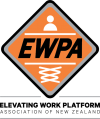About the EWPA
Specific initiatives have included:
Training
The Association has encouraged and endorsed the development of unit-standard based, quality-assured MEWP Operator courses by independent trainers. Such NZQA accredited operator training is now widely available.
Maintenance & Inspection
The Registered Inspector Program is an EWPA initiative, designed ‘by industry for industry’, to assist a PCBU in determining a Competent person for MEWP inspection. The program provides evidence of knowledge, skills and experience of the inspector, providing confidence they have the expertise required for conducting 6-month inspections of Mobile Elevating Work Platforms (MEWPs) in line with Australian Standard AS2550.10, AS/NZ1418.10 and the Worksafe MEWP Best Practice Guidelines.
This program aims to enhance compliance and consistency in MEWP inspection and maintenance, promote adherence to industry standards and best practices and provide MEWP owners and operators with confidence in equipment safety and compliance.
Further, the Certifying Board of Inspection Professionals operates a competency certification system directed by WorkSafe NZ. This alternative Inspection certification provides similar assurances to PCBU’s and owners of MEWPs that the inspector understands a quality assurance model of inspection.
Best Practice Definition
The EWPA‘s current definition of best practice is based upon full compliance with the Best Practice for Mobile Elevating Work Platforms and it's associated standards. In conjunction with regulatory authorities and standard-setting bodies we provide unambiguous interpretation of inspection and maintenance requirements.
